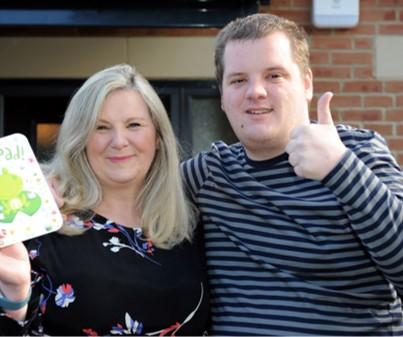New council home is a dream for James
A SUNDERLAND mum has praised life-changing new council homes that are enabling her profoundly autistic son to spread his wings.

A SUNDERLAND mum has praised life-changing new council homes that are enabling her profoundly autistic son to spread his wings.
Michele Carr has described the council's specially adapted bungalows at Albert Place, Columbia, as 'everything [she] could have wished for' as the first home for her son James, who is moving into the property with 24/7 care.
James, 26, has severe autism that means he has the communicative abilities of a four-year-old. Despite his condition, his family have always planned to support him to live a full life, enjoying his own independence with care wrapped around him to ensure his needs are met.
Built by Sunderland City Council, the first of the homes it has developed itself in more than 40 years to be completed, Albert Place is one of the schemes delivered as part of its £59m Housing Delivery and Investment Plan (HDIP). The bungalows have been custom-designed and developed for people with disabilities and challenges with mobility, as well as those who have support-needs that could be better met with one-storey living.
Working with a multi-disciplinary team, including a team from Sunderland City Council's adult social care and Sunderland Care and Support, the Carr family have been working towards James's independent-living plan for more than 10 years.
Michele said: "We are absolutely thrilled with the bungalow. It has been an absolute dream for us to find a property like this for James. Though we have planned this for many years, it's been very tough, emotionally, for us as a family to take the steps towards James's independence.
"But knowing that he is moving to such a beautiful home, where his needs can be supported, is just wonderful and has made the transition much easier for us. The bungalow is in such a quiet location too, making it perfect for someone with sensory challenges. It really is fit for purpose and better than we could have even dreamt of."
The home - constructed by Tolent - has been adapted with the help of the council's social care team, to ensure that it is suitable to support James's needs. It features a range of assistive technology devices - which James is able to operate himself - to allow him to maintain a sense of independence.
It is one of 117 bungalows that will be built by Sunderland City Council as part of its HDIP by 2025. Each is intended to support vulnerable residents, delivering high-quality housing for those with additional needs and older people.
"It's incredible. And I think it's a case study for how people with disabilities, like James, should be supported to live. This is best practice. It's about supporting and enabling people to live independently and that's what we are going to be able to achieve with James's move to this new property," said Michele.
"James's dad and I are getting older, and meeting his needs is getting harder for us. We have always known that we would need a plan to enable James to live independently and he deserves the opportunity to enjoy as much freedom and privacy as possible. This move is giving him that.
"It's been a gradual build to get to this moment. But in this home, and with the support and technology in place, we know he is going to be able to enjoy a better quality of life and the independence we want him to have."
In addition to practical technology that will allow James to control things like the heating, the home is also being kitted out with assistive technology to meet James' specific needs. Among the tech he will have access to includes a smart toothbrush. Like many people with autism, James has challenges maintaining his oral hygiene independently. The toothbrush - which gamifies the process of brushing teeth - will challenge James to 'colour in his teeth' with toothpaste, helping him brush thoroughly, preventing issues from developing and keeping him well at home. Sunderland City Council's strong track record in social care is due in part to its award-winning use of assistive technology to support vulnerable residents, including scooping a coveted award from the Technology and Entrepreneurship Center at Harvard
Michele added: "This is all about prevention, not cure. About supporting people to live well and independently; helping people to manage. In the same vein, as myself and my husband get older, we don't want to hit crisis point by trying to care for James beyond our capabilities, so this has been a well-thought out plan to get James to the point of being able to live independently and we're so delighted that - through these bungalows - we can take this huge step as a family."
The bungalows were handed over last month, with tenants moving in over the past few days and are the first new-build council homes to be completed in more than 40 years.
Councillor Kevin Johnston, dynamic city cabinet member, said: "We're delighted with the life-changing difference these bungalows are making to our residents.
"James, and the other residents who now call Albert Place home, deserve to be supported with high-quality homes that meet their needs and that is exactly what we're trying to achieve through the HDIP and through this scheme. We could not be happier to see these brilliant new homes now in use."
James is the newest resident to move into Albert Place, where four fully-adapted bungalows now stand. With the help of £172,000 in funding from Homes England's Affordable Homes Programme, the bungalows, which are part of a wider development including a planned supported scheme in a former school building opposite, include a range of features to make life easier for residents, such as remote heating and lighting controls to support independent living.
Over the next five years, Sunderland City Council will be delivering 117 new build bungalows across the city, and through new build, conversion and refurbishment will create 95 new homes as supported accommodation. These homes form a crucial part of the council's wider plan to create more than 7,000 new homes in the city over the next decade.




